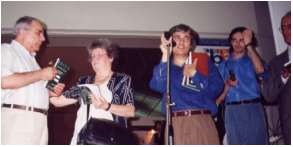|
agonia english v3 |
Agonia.Net | Policy | Mission | Contact | Participate | ||||
|
|
| |||||
| Article Communities Contest Essay Multimedia Personals Poetry Press Prose _QUOTE Screenplay Special | ||||||
 |
|
|||||

agonia 
■ Nothing sought
Romanian Spell-Checker Contact |

- - -
- - - - - - - - - - - - - - - - - - - - - - 2004-10-16 | |
Although the first years of his life were marked by the Second World War and by the fact that his parents were arrested and sent to prison by the communists, Nicolae Manolescu says he did not have an unhappy childhood but rather a normal one. In 1946,l after the Red Army had entered Romania he saw electoral leaflets for the first time. He was only seven then and they made quite an impression on him. He collected the little bits of paper that read "Vote the eye!" "Vote the fountain!" "Vote the Sun!" (Various logos of the competing parties). People distributed some, but those that read "Vote the Sun!" were being thrown from a plane. When he asked his father why were not all bestowed in the same manner, he told him that the people with the plane represented the state.
Perhaps that is where he got the impression that the state is something above, that throws things at us without asking for our approval. When his father got out of the communist's prison he sad nothing of the treatment he received in prison but stated that they had not slapped him. The idea that someone, even the state, could slap his father seemed preposterous. More preposterous even than the tortures he might have endured. None of the things he discovered afterwards (the assassinations, the beatings, the tortures in the communist prisons) seemed as demeaning as a slap on the cheek of someone as distinguished as his father. Nicolae Manolescu started writing soon in life. He had always enjoyed reading and he began his prose in the manner of the authors he read. As soon as he finished a book he wrote something in its style. He kept the style of Jules Verne for a while then he switched over to Vasile Alecsandri's. For a long time, he thought he had a literary instinct. Later on he discovered he had a critic instinct. His writings were his first critic works translated into fiction, poetry or prose. During high school he was disappointed by the lack of literary activity. He does not remember having colleagues inclined towards literature at the Lahovari high school in Ramnicul Valcea or at the Gheorghe Lazăr high school in Sibiu. There were neither students' publications nor teachers to encourage such an endeavor. The literary life was pretty dull in college also, although he does remember of a few students that were already writing, the poet Ilie Constantin among them. There was also a literary club where he missed his appointment by accident. This saved him, for the students that were there were arrested and sent to prison. For his involvement with the "rebels" he was expelled from school. There were hard times for the "free of mind," his colleagues who participated to the seances of the club spent many years in prison and were released only in 1964. Nicolae Manolescu says that one of the writers that marked him was George Călinescu. He read from his works when he was visiting with some friends. He was in their library and he found the 1941 edition of the "Literature History" by Călinescu and he read it avidly. He kept the notes he took and later, when he reviewed them he was shocked by the things Călinescu said about the Romanian authors. During the late '50s, he met Călinescu when the latter was an honorary professor, brought by George Ivaşcu at the Faculty to meet the students. This time he pleasantly shocked him and it unleashed in him the desire to speak his mind. For years he imitated Călinescu's style but criticised him in a few articles. Călinescu sent a rather strong letter to George Ivaşcu, his publisher saying he was disturbed by Nicolae Manolescu's ...style. Strange he did not recognise his own phraseology and linguistic patterns. He was also disturbed that "a young author of little proficiency" was published weekly on the same page as him. During the '70s he was approached by Radu Călin Cristea, a critic that proposed him to start a literary club called "The Monday Club." He accepted after giving it some thought although he was still haunted by memories of what had happened to his colleagues in faculty. The Monday Club had the chance to gather some very talented young artists. It soon became a literary landmark and Nicolae Manolescu managed to cultivate the critic spirit in his followers. The club remained operational until 1983, when it was closed due to the intellectual nature of the literature it promoted. Nicolae Manolescu thinks that politics and society will change. However he is aware of the fact that change always comes slowly and it will be a while until we can boast with our wisdom. Gelu Vlaşin http://site.neogen.ro/Geluvlasin/
|
||||||||
|
|
|
|
|
|
|
|
|||
| Home of Literature, Poetry and Culture. Write and enjoy articles, essays, prose, classic poetry and contests. | |||||||||
 |
|
